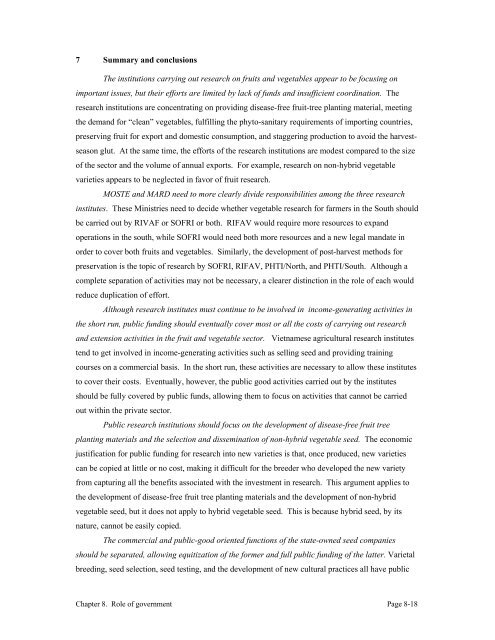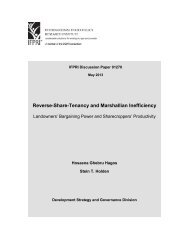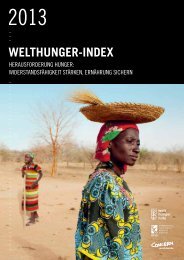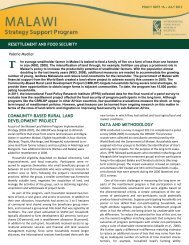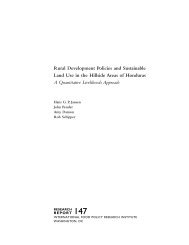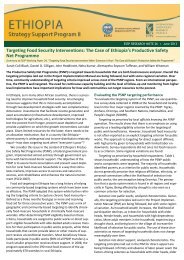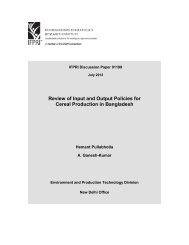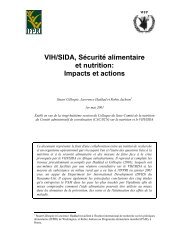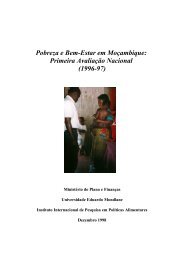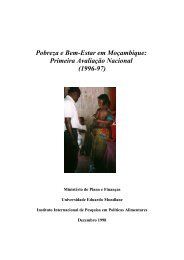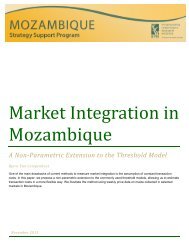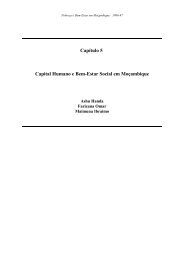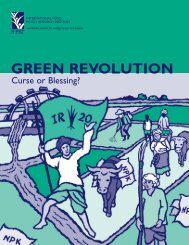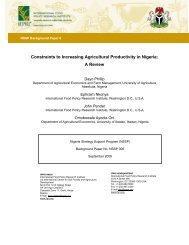Fruits and Vegetables in Vietnam - International Food Policy ...
Fruits and Vegetables in Vietnam - International Food Policy ...
Fruits and Vegetables in Vietnam - International Food Policy ...
Create successful ePaper yourself
Turn your PDF publications into a flip-book with our unique Google optimized e-Paper software.
7 Summary <strong>and</strong> conclusions<br />
The <strong>in</strong>stitutions carry<strong>in</strong>g out research on fruits <strong>and</strong> vegetables appear to be focus<strong>in</strong>g on<br />
important issues, but their efforts are limited by lack of funds <strong>and</strong> <strong>in</strong>sufficient coord<strong>in</strong>ation. The<br />
research <strong>in</strong>stitutions are concentrat<strong>in</strong>g on provid<strong>in</strong>g disease-free fruit-tree plant<strong>in</strong>g material, meet<strong>in</strong>g<br />
the dem<strong>and</strong> for “clean” vegetables, fulfill<strong>in</strong>g the phyto-sanitary requirements of import<strong>in</strong>g countries,<br />
preserv<strong>in</strong>g fruit for export <strong>and</strong> domestic consumption, <strong>and</strong> stagger<strong>in</strong>g production to avoid the harvestseason<br />
glut. At the same time, the efforts of the research <strong>in</strong>stitutions are modest compared to the size<br />
of the sector <strong>and</strong> the volume of annual exports. For example, research on non-hybrid vegetable<br />
varieties appears to be neglected <strong>in</strong> favor of fruit research.<br />
MOSTE <strong>and</strong> MARD need to more clearly divide responsibilities among the three research<br />
<strong>in</strong>stitutes. These M<strong>in</strong>istries need to decide whether vegetable research for farmers <strong>in</strong> the South should<br />
be carried out by RIVAF or SOFRI or both. RIFAV would require more resources to exp<strong>and</strong><br />
operations <strong>in</strong> the south, while SOFRI would need both more resources <strong>and</strong> a new legal m<strong>and</strong>ate <strong>in</strong><br />
order to cover both fruits <strong>and</strong> vegetables. Similarly, the development of post-harvest methods for<br />
preservation is the topic of research by SOFRI, RIFAV, PHTI/North, <strong>and</strong> PHTI/South. Although a<br />
complete separation of activities may not be necessary, a clearer dist<strong>in</strong>ction <strong>in</strong> the role of each would<br />
reduce duplication of effort.<br />
Although research <strong>in</strong>stitutes must cont<strong>in</strong>ue to be <strong>in</strong>volved <strong>in</strong> <strong>in</strong>come-generat<strong>in</strong>g activities <strong>in</strong><br />
the short run, public fund<strong>in</strong>g should eventually cover most or all the costs of carry<strong>in</strong>g out research<br />
<strong>and</strong> extension activities <strong>in</strong> the fruit <strong>and</strong> vegetable sector. <strong>Vietnam</strong>ese agricultural research <strong>in</strong>stitutes<br />
tend to get <strong>in</strong>volved <strong>in</strong> <strong>in</strong>come-generat<strong>in</strong>g activities such as sell<strong>in</strong>g seed <strong>and</strong> provid<strong>in</strong>g tra<strong>in</strong><strong>in</strong>g<br />
courses on a commercial basis. In the short run, these activities are necessary to allow these <strong>in</strong>stitutes<br />
to cover their costs. Eventually, however, the public good activities carried out by the <strong>in</strong>stitutes<br />
should be fully covered by public funds, allow<strong>in</strong>g them to focus on activities that cannot be carried<br />
out with<strong>in</strong> the private sector.<br />
Public research <strong>in</strong>stitutions should focus on the development of disease-free fruit tree<br />
plant<strong>in</strong>g materials <strong>and</strong> the selection <strong>and</strong> dissem<strong>in</strong>ation of non-hybrid vegetable seed. The economic<br />
justification for public fund<strong>in</strong>g for research <strong>in</strong>to new varieties is that, once produced, new varieties<br />
can be copied at little or no cost, mak<strong>in</strong>g it difficult for the breeder who developed the new variety<br />
from captur<strong>in</strong>g all the benefits associated with the <strong>in</strong>vestment <strong>in</strong> research. This argument applies to<br />
the development of disease-free fruit tree plant<strong>in</strong>g materials <strong>and</strong> the development of non-hybrid<br />
vegetable seed, but it does not apply to hybrid vegetable seed. This is because hybrid seed, by its<br />
nature, cannot be easily copied.<br />
The commercial <strong>and</strong> public-good oriented functions of the state-owned seed companies<br />
should be separated, allow<strong>in</strong>g equitization of the former <strong>and</strong> full public fund<strong>in</strong>g of the latter. Varietal<br />
breed<strong>in</strong>g, seed selection, seed test<strong>in</strong>g, <strong>and</strong> the development of new cultural practices all have public<br />
Chapter 8. Role of government Page 8-18


